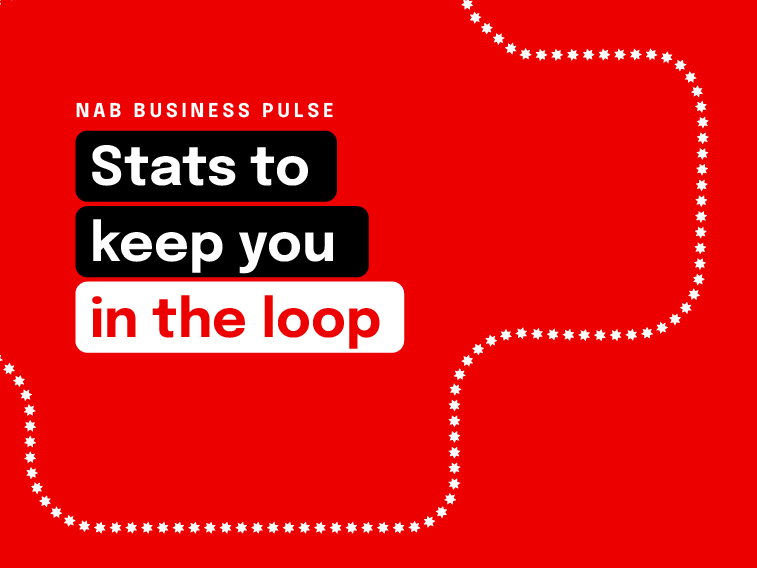Change is a constant in our global environment, but that's all the more reason to keep moving forward on your terms.


Article
What will the new year bring in the world of business trends? Whether it’s health or agriculture, hyper local advertising or self-trained artificial intelligence, NAB has one eye on the (crystal) ball.

“I want to put a ding in the universe.” “If you can dream it, you can do it.” “What is now proved was once only imagined.”
So said Steve Jobs, Walt Disney and William Blake and, while they were all speaking at their own points in history, their thoughts on the notion of innovation are timeless. It’s personal yet universal, impossible yet achievable, creative yet scientific. It’s about breaking norms, seeking the unimaginable, and being comfortable with the uncomfortable.
In 2018, we look at five trends in innovation set to affect Australian businesses and industry sectors, and those with an interest in how new thinking is shaping the future.

Innovation is changing the shape of the workforce. Technology has made the gig economy possible and, already, almost a third of working Australians are freelance. Now Artificial Intelligence (AI) is making rapid inroads into white- as well as blue-collar jobs.
McKinsey has found that about half the activities people are paid to do globally could theoretically be automated, but less than five per cent can be fully automated. That means human-robot interaction could be big news in the future, with the most successful companies tapping into both sets of skills and abilities. Whether it’s an AI algorithm performing laborious research for a lawyer or a human monitoring the output of a robot production line, 2018 will see the continuing evolution of humans working with machines to provide better, cheaper services for customers.
We may also see:

On a good day, a doctor might read as many as five research papers. IBM Watson™ can read about two million a minute and scan for relevant clinical trials at the same time.
Watson is one of the new breed of cognitive supercomputers disrupting everything from banking to space exploration. In medicine, Watson’s extraordinary ability to review and summarise huge quantities of data is helping doctors diagnose complex conditions faster and identify highly-personalised treatment plans. Cognitive supercomputers also learn continuously from their interactions – self-trained artificial intelligence (AI) algorithms can already predict heart attacks more accurately than guidelines created by human specialists.
Now a fixture at hospitals such as New York’s Memorial Sloan Kettering Cancer Center, cognitive computers have the potential to transform the health sector on a global scale with personalised, integrated, high-quality care.
We may also see:

Agriculture technology, or AgTech, continues to be a story to watch. As NAB’s General Manager of Agribusiness Khan Horne said recently: “The role AgTech plays in the global Agricultural sector will continue to grow in importance as the United Nations’ Food and Agriculture Organisation (FAO) estimate that food production capacity needs to increase by 70% to meet projected global population growth over the next 20 years.”
Yet as Horne also points out in NAB’s new Backing Rural Australia report, cost and a desire to see proven results before committing have constrained uptake of technology on the land. Many Australian farmers are still unable to access the internet capacity they need to support new technologies while others lack the right skills.
So, will we perhaps see technologists moving to the bush? Agribusiness firm Ruralco has said it’s finding it easier to attract graduates now that technology in agriculture is firmly on the radar. We could see more city-born tech-savvy graduates making rural Australia their home – as long as the way is cleared for them to put innovation to work in boosting cost-effective production.
We may also see:

If current trends continue, impact investing could be worth almost $1 trillion by 2020. Unlike other ethical investments which take a ‘do no harm’ approach, impact investing is about doing positive good – having a measurable social and environmental impact as well as achieving a financial return.
In the report Socially Responsible Investing: Value and Values, JBWere’s Head of Philanthropic Services Shamal Dass describes the four characteristics that define this kind of investment: intentionality; investment with return expectations; range of return expectations and asset classes; and impact measurement. The report also points out that responsible investments now represent more than half of all professionally managed assets in Australia, with growth of 249 per cent between 2014 and 2016.
However, there are obstacles to overcome – particularly the need for more accessible and reliable data. Innovative approaches such as #ShareYourData, which aims to consolidate and process data from across the impact investing space, could drive impact investing into the mainstream by improving disclosure, transparency and the quality of measurements around both the scope and returns of investments.
We may also see:

In 2018, Americans will spend more than $200 billion online. More than 70 per cent of those transactions will be mobile and, as more millennials discard their desktops, the percentage will continue to rise – so how can retailers make the most of this growth in online and mobile spending?
The Progressive Web App (PWA) is a Google innovation that gives shoppers the slick and streamlined experience they enjoy on a desktop for a much lower cost than the alternative – a specially-created native app. PWAs give retailers more opportunities to upsell through special offers and promotions, and they can also help boost conversion by removing pain points that come between customers and a sale. There’s no time wasted on downloads and, with a checkout on a par with desktop, users are less likely to abandon their trolleys in frustration. Google recently announced that PWAs can now integrate with native/web payment apps, so 2018 could see customers making one-tap payments through providers including Android Pay, Samsung Pay, Alipay and PayPal.
We may also see:
© National Australia Bank Limited. ABN 12 004 044 937 AFSL and Australian Credit Licence 230686.